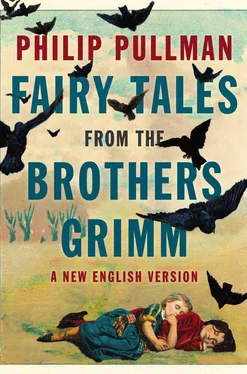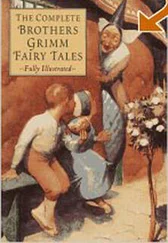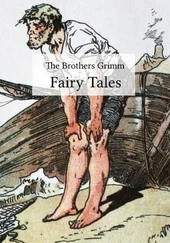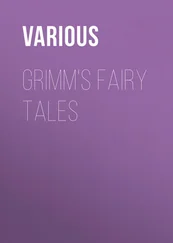‘I don’t know,’ said the princess. ‘I was sad, and now I’m joyful. I feel as happy as if my bridegroom had come.’
She told the king everything that had happened, defying the brothers, who had threatened to kill her if she revealed the truth. The king ordered the whole court to gather, and the young prince was there too, in the rags he’d got from the poor man. The princess recognized him at once, and ran to embrace him, and the wicked brothers were seized and put to death. The young prince was married to the princess, and appointed heir to the king.
But what about the poor fox? One day, a long time afterwards, the prince happened to be walking in the forest when he came across his old friend, who said: ‘You’ve got everything you want now, but I’ve had nothing but bad luck for years; and you refused to set me free, even though I asked you to.’
And once again the fox begged the prince to shoot him and cut off his head and his paws. This time the prince did it, and as soon as it was done, the fox changed into none other than the brother of the princess, released at last from a spell that had been cast over him.
And from then on nothing was missing from their happiness as long as they lived.
* * *
Tale type:ATU 550, ‘Bird, Horse and Princess’
Source:a story told to the Grimm brothers by Gretchen Wild
Similar stories:Alexander Afanasyev: ‘Prince Ivan, the Firebird, and the Grey Wolf’ ( Russian Fairy Tales ); Katharine M. Briggs: ‘The King of the Herrings’ ( Folk Tales of Britain ); Andrew Lang: ‘The Bird Grip’ ( Pink Fairy Book )
Gretchen Wild and the Grimms made an exceptionally neat job of this tale, which can easily ramble. In doing so they turned it into something closely resembling an occult or esoteric narrative of quest and salvation, not unlike the third-century gnostic ‘Hymn of the Pearl’ or The Chymical Wedding of Christian Rosenkreutz of 1616. It would be easy to construct an interpretation on such lines: the young prince would be the questing individual, the golden princess his female other half, or in Jung’s terms his anima , who has to be won from the unseeing powers of the world: unseeing because of the mountain blocking the king’s view, of course. When the mountain is removed, that king becomes wise enough to see, and lets the young bride go to her true destination. The golden horse is the prince’s own strength, which must not be saddled with the gaudy trappings of flattery and conceit, but only with the dignity of true and honest toil. The golden bird is the prince’s soul: only he can see it in the king’s garden, only he can follow it and win it at last. The two brothers are the prince’s lower selves, overcome in the end by his innocent goodness; and he is aided by the fox, who of course is wisdom. Wisdom is closely related to the questing individual’s own self (he is the princess’s brother) but can’t be seen for what it is till it’s sacrificed. The golden apples in the king’s garden are fragments of truth, which ought to be given away freely with a generous hand, but which the king, blinded by a narrow understanding, treats as possessions that must be counted and numbered, thus failing to…
And so on. I don’t believe this interpretation for a moment, any more than I believe in most sub-Jungian twaddle, but it’s possible. Such a reading could be sustained. What does that show? That the meaning preceded the story, which was composed to illustrate it like an allegory, or that the story fell accidentally into an interpretable shape?
Obviously the latter. Much ingenious interpretation of story is little more than seeing pleasing patterns in the sparks of a fire, but it does no harm.
There was once a village where every single farmer was rich except for one, whom they called Farmerkin. He didn’t even have the money to buy a cow, though he and his wife longed to have one.
One day he said to her, ‘Listen, I’ve got a good idea. You know your cousin the carpenter — let’s get him to make us a calf out of wood, and paint it the proper colour, so it looks real. It’s bound to grow up eventually, and then we’ll have a cow. What d’you reckon?’
‘That’s a good idea,’ said his wife.
So they went to the carpenter and explained what they wanted, and he got some good pieces of pine and sketched it out and then sawed and planed and carved and nailed it all together, and then he took some brown paint and painted it till you could hardly tell it wasn’t real. He’d made it with its head down as if it were grazing, and given it some long black eyelashes too.
When the village cows were driven out to the pasture next morning, Farmerkin called the cowherd and said, ‘I’ve got a young calf here, but she’s too small to walk yet. She needs to be carried.’
‘Fair enough,’ said the cowherd, and he picked up the calf, carried it to the pasture, and set it down on the grass. The cowherd said to himself, ‘She’ll be running around soon. Look at her tuck into that grass!’
When it was time to drive the cows home that evening, the cowherd couldn’t make the calf move. ‘Damn it,’ he said, ‘you’ve been guzzling away all day long, I reckon you’re strong enough now to walk home on your own four legs. I ain’t going to carry you both ways.’
Farmerkin was standing outside his front door waiting for the calf to come back. Along came the herd of cows, and behind them was the cowherd, but there was no sign of the calf.
‘Hey!’ said Farmerkin. ‘Where’s my calf, then?’
‘She’s still out there grazing. I called her, but she didn’t move. I can’t wait all day — these cows want milking.’
The cowherd got the cows settled in the milking parlour, and then went back to the pasture with Farmerkin, but by the time they got there, someone had stolen the calf.
‘That’s your fault,’ said Farmerkin.
‘No, it ain’t! She must have wandered off.’
‘Well, you should have fetched her back,’ said Farmerkin.
And he took the cowherd to the mayor, who was shocked at the cowherd’s negligence and ordered him to give Farmerkin a cow to make up for his loss.
So now Farmerkin and his wife had the cow they’d been longing for. They were happy about it, but they had no feed and they couldn’t afford to buy any, so they had to have her slaughtered. They salted the meat and tanned the hide, and it was a nice hide too, so Farmerkin set off for town with it, intending to sell it and buy a calf.
On the way he went past a mill, and there sitting on the ground was a raven with both wings broken. Farmerkin felt sorry for the bird, so he picked it up carefully and wrapped the hide around it. Dark clouds were gathering in the sky and the wind was getting brisker, and no sooner had he got the raven wrapped up than the rain started pouring down. There was nowhere else to shelter, so Farmerkin knocked on the door of the mill.
The miller’s wife, who was alone there, opened the door to him.
‘What d’you want?’ she said.
‘Sorry to trouble you, missis, but could I take shelter here?’
‘Oh, I suppose it is coming down a bit… All right, come in. You can lie down in the straw over there.’
She pointed to a big heap in the corner, and when Farmerkin was comfortable she brought him some bread and cheese.
‘Very good of you, missis!’
‘Well, it looks as if it’s set in for the night,’ she said.
Farmerkin ate the bread and cheese and then lay down and closed his eyes, with the hide beside him. The woman, who was keeping an eye on him, thought he must have been tired, and as Farmerkin didn’t stir, she was sure he’d gone to sleep.
Читать дальше












